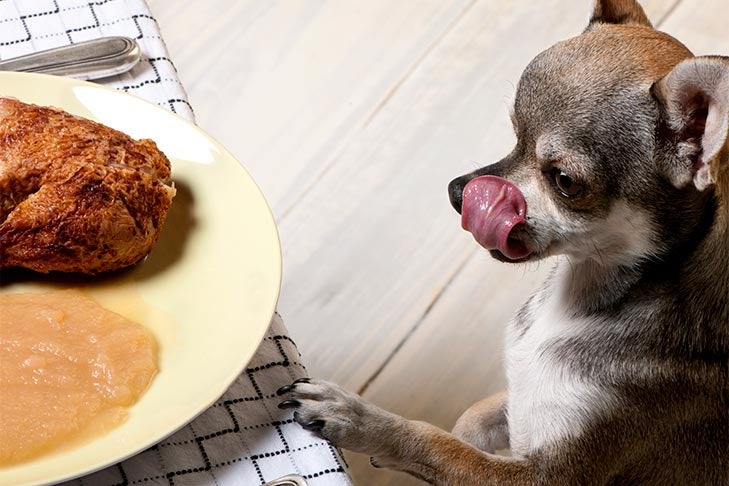AKC is a participant in affiliate advertising programs designed to provide a means for sites to earn advertising fees by advertising and linking to akc.org. If you purchase a product through this article, we may receive a portion of the sale.
Thanksgiving, for most families in the United States, is all about the turkey. Hours go into the roasting and basting of the bird, and once the Thanksgiving feast is over, there are turkey sandwiches, turkey soup, and turkey casseroles to make. With all of that leftover turkey, what about sharing some with our dogs, whether slipped surreptitiously under the table, or on a Thanksgiving “plate” of their own?
But can dogs eat turkey? Is turkey good for dogs? Are any risks to feeding dogs turkey? We’ll walk through everything you need to know about turkey for dogs, from the benefits to the risks.
Can Dogs Eat Turkey?
Whether or not dogs can eat turkey depends on how the turkey is cooked. Turkey is not inherently toxic to dogs. It’s used as an ingredient in many commercial dog foods, and is rich in protein, riboflavin, and phosphorous. When turkey is cooked plain—in other words, without added salt, fat, or seasonings—turkey can be a wholesome part of a homemade dog food diet under the guidance of your veterinarian.

That said, the turkey we eat on Thanksgiving platters is rarely cooked “plain.” We rub our birds with butter or oil, and season them with all sorts of combinations of salt, pepper, herbs, and spices. Many cooks opt to stuff their turkey with onions, garlic, apples, carrots, celery, mushrooms, and more. To people eating the meal, all of these flavors, aromas, and textures can be delicious. For our dogs, some of these seemingly healthy ingredients can actually be toxic (ie, onions). Even if some common Thanksgiving ingredients aren’t exactly toxic to dogs, they can still be a recipe for unpleasant digestive upset or pancreatitis. (And just so there’s no confusion: onions are toxic to dogs.)
How to Safely Feed Your Dog Turkey
If you decide to feed your dog turkey, keep these tips in mind.
- Remove turkey skin: Too much fat (from the skin itself, plus whatever butter or oil was used for roasting or frying) and seasonings are dangerous for dogs. High fat content can cause pancreatitis, while all the extra spices and seasonings can irritate your dog’s stomach.
- Only feed your dog turkey meat: Pick through whatever meat portion you’re offering your dog to ensure none of the roasting aromatics are mixed in. Onions are toxic to dogs, and garlic can be toxic in large quantities.
- Feed your dog small portions of turkey meat: Talk to your vet about adding occasional food scraps into your dog’s diet before deciding to feed them turkey, especially if your dog has a preexisting health condition, like diabetes. Keeping portions small, and more like a treat, helps healthy dogs avoid any stomach upset from eating different foods than they’re used to.
- No cooked turkey bones: Make sure whatever portion of turkey you decide to feed your dog contains just meat, and that there are no cooked turkey bones mixed in or still attached.
Can Dogs Eat Turkey Bones?
Cooked poultry bones are brittle. This, combined with their smaller size, makes them very dangerous for dogs. Veterinarians caution against feeding dogs cooked bones of any kind, including poultry bones, as they can cause the following problems:
- Mouth and tongue injuries
- Obstruction of the throat or intestinal tract
- Choking
- Possibly piercing stomach and intestine lining
- Constipation
- Rectal bleeding from sharp bone fragments
- Blockages that require emergency surgery
Some dog owners will choose to feed their dogs raw meaty bones as part of their diet, and in consultation with their vet. Raw turkey necks are a common choice for this purpose, but any raw meaty bone carries with it a risk of exposure to bacteria like salmonella. Talk with your vet about using raw meaty turkey bones for your dog to learn more about possible risks and benefits.
What If I Don’t Want to Share Turkey With My Dog?
There’s no rule that says you have to share turkey with your dog on Thanksgiving (or on any day!). In fact, many dog owners spend lots of time and effort making sure their dogs don’t beg at the table, or they specifically don’t share food from their own plates. But if you choose to give turkey to your dog, there are safe ways to do so. (Be sure your dinner guests are aware of your preferences, as well.)
If you’d like to include your dog in your Thanksgiving Day festivities without worrying about human food rules, you can always opt to give your dog a turkey drumstick-shaped chew toy, a turkey-shaped treat dispensing toy, turkey tendon dog chews, or even a celebratory plate of Thanksgiving Dinner canned dog food.
The Verdict on Turkey for Dogs
Yes, you can feed your dog turkey safely, as long as you follow the above guidelines. However, feeding table scraps to dogs on a regular basis can lead to a dog that’s obese, which causes a host of problems, including diabetes, hypertension, and joint stress. If your dog has an upset stomach after eating turkey, consult your vet and consider an over-the-counter dog diarrhea treatment.
If you have more questions, talk with your vet about how to safely feed turkey to your dog.

